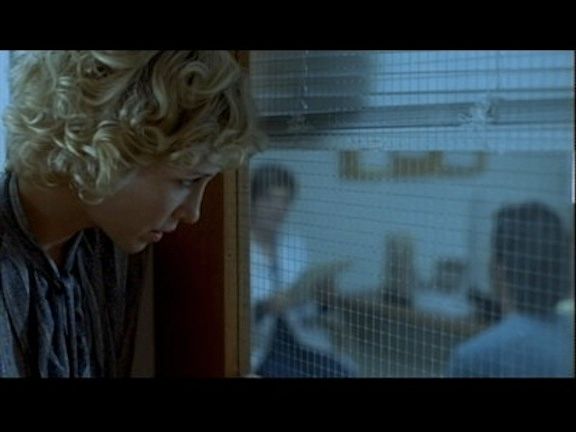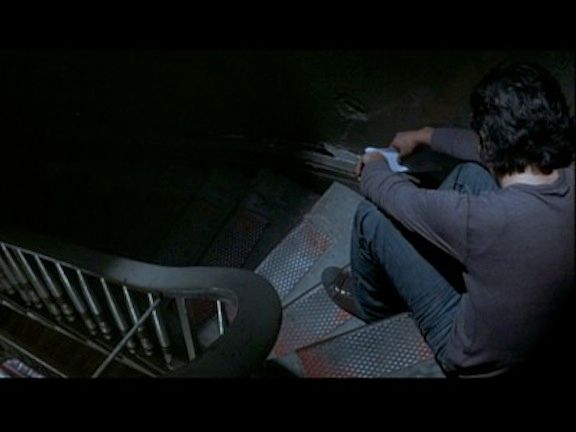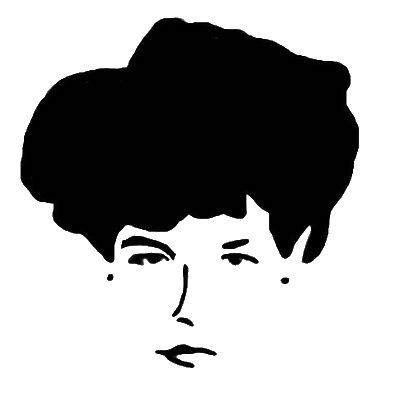

The other night I watched a movie about two lovers who can't be together, aren't together, but come together. Who weren't even supposed to be lovers. Who don't start out that way. Who start off having sex. It's a long story why. But sex is a threshold. Through sex these two people cross over into love. At first the two lovers are just two people who have sex for one specific reason. Who don't and can't look at each other when they do. Who go through the motions because they have to. But then something happens, something changes, the two bodies latch on and lock, and we see sex turn into love. We see the difference between the two. Two separate bodies start to see each other, feel each other, and the form changes, even though the medium--sex--is the same. Their bodies react to and act out love even before they know how they feel. Their bodies tell them first.
After they reunite and make love in a way they never have before, the male lover asks the female lover, "You wanted to say something the last time we saw each other, but you didn't. What was it?" The female lover answers, "I wanted to say, thank you." It's a long story why. The male lover says, "That's it? Why didn't you say it?" Because, the female lover tells the male lover, who is like a female lover, "I thought it would separate us forever."
I understand what the female lover means. How even one word can change everything, so you don't use it. You don't say it. How one word is a catalyst for a breach or a copula. You hold onto a word or you let a word go. You let it do its breaking. How something like "thank you," which is meant to join, can actually separate. How one word becomes a thread that snaps or a thread that ties. You and another person. And now I understand why you didn't say goodbye. Why you just got up and walked away. Only now it doesn't matter why you did what you did. Why you didn't say what you didn't say. Sometimes a reason is not enough. Sometimes a reason expires. And at the end of the movie, even though the male lover is not in the frame, he is in the picture. The way when you have love, it's anamorphic, so it's there even when it's not there in plain view. Like cinemascope it wraps around. Is wider than you can imagine. Shows the entire picture, the whole picture, even the picture that doesn't show. The picture you can't see.
It was his picture first. His life hanging on his wall. It was their future and she saw it. Went forward. It was his past and she would one day be on the other side of time. An image that belonged to him, that he said he didn't miss, but reminded him of home. Still a stranger, she noticed the picture, which was really a crystal ball, a divination, a poster of a vast ocean from a travel site, and she asked him about it. Where is that? It is a beach in Korea. It is where he's from. But later this is where she ends up with their son. On this beach. This picture was hers, her life, all along. Half of her, half of him.
They are seeing things before they are even there, or those things are there because they have come together and want to see them. Need to seem them. Are capable of this sight, and their unity make these visions possible. They are connected and making connections. This is why they are connected. Seeing and following the signs. They are signs too. For each other.
He sees (feels) her without seeing her. She sees (feels) him without seeing him. Has an orgasm at the thought of him; at the thought of him doing what he hasn't even done yet, what he will do, his face between her legs, him fucking her the way he hasn't fucked her yet, but could, knows how to. Will.
She has this orgasm while sitting with her husband and his family, while celebrating her pregnancy, her marriage to another man. What is a marriage? She makes a sound as if she is coming, to echo the silent sound (vibration) of his coming, and when everyone turns around to look at her, she blames the sound, the one that accidentally leaks out of her mouth, on pregnancy pains. What is pregnancy? What is laborious? What is giving birth? She says she is too hot. She feels, gets aroused, by his trace, by the idea of him showing up. Coming. He comes (cums), she comes (cums). Orgasm becomes a reunion.
For months I felt you everywhere. I thought it was real. The feeling, which felt like your actual body coming. The law of physics, which says we must both be doing this--thinking this, feeling this--for such a magnetic pull to occur. I thought you were actually somewhere near me, all the time. Thought that like a character in a movie, it meant you were coming.
The trace he leaves behind. The residue of his brief presence there. Minutes before, he had actually tracked down where she lives from a dry cleaning receipt for a coat her husband tried to kill himself in, in a bathtub of water, and showed up at her house. Just stood outside of it in an orange t-shirt, dressed like a teenage boy, and her husband came out to ask if he was a guest and he said no. Said he had the wrong house. He is an immigrant, an outsider, all he does is work, all these jobs, while her husband's family are immigrants with a son who has made it inside as an outsider. But outsiders--some outsider--always remain.
So he's there, he was, and suddenly, through her husband's body, which was just next to his body, she knows it even though she doesn't know it, and knowing this in the way that she knows it, which is to feel it, gives her this enormous surge (awakening) of pleasure. This overpowering rush (premonition) of touch, which is also an epiphany. Intelligence. Maybe alien, but destiny is really desire's true dwelling. A body showing up, arriving, reaching yours. Like a telegram. The other's body as a home for your body. When everyone in class, including my teacher, says that unity with the other is impossible, I know better. I know it's been possible. I know all the theories, I just don't believe them. At the end of the day, I believe in the possible, in communion, in the other as the only faith, in the odds and the stakes and the signs, because my body and heart know better.
